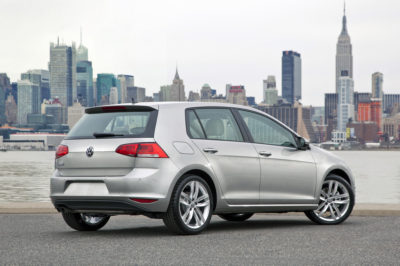Volkswagen has been in the news a lot lately, frequently for the wrong sort of reason. In late 2015, it came to light that the German manufacturer had lied about how clean-running its four-cylinder diesel engine was, a revelation that had a major impact on one of its most popular models, the Golf hatchback.
Notwithstanding the fact that VW had to shelve its diesel-powered models for more than 18 months, owners had reported some reliability concerns related to that 2.0-litre engine.
A high-pressure fuel pump under the hood boosts fuel pressure to the level required by the engine’s injection system, and its durability has been the subject of much discussion. What’s not clear is whether it’s actually unreliable, or simply gets ruined when diesel-ignorant North American owners accidentally put gasoline in their car’s tank, something that apparently happens more than we’d have guessed.


Because it’s turbocharged, the diesel engine has an intercooler to cool the temperature of the air going into the combustion chambers. Ice can form inside that radiator-like component during winter, and when it melts can be sucked into the engine, where it can cause serious damage. VW devised a fix intended to prevent moisture from accumulating in the intercooler, but owners report mixed results.
Prior to 2016, if you bought a non-diesel Golf, the engine in it was a 2.5-litre five-cylinder. That motor used a metal timing chain (as opposed to a rubber belt that would have required more frequent replacement) to run the valve train in the cylinder head. A set of guides whose job it is to maintain tension on the chain can wear out, causing the chain to loosen and creating a rattling noise and, in cases of extreme wear, triggering a warning light. There are two sets of guides, one near the top of the engine and another near the bottom, and it appears the set near the top is more likely to need replacement, which is a good thing, as that’s the less-expensive job.
Finally, some Golf models outside the high-performance GTI range use a dual-clutch automatic transmission that works very well, but is known for shifting into neutral for no reason and without warning. The cause is electronic, and the fix could either be an update of the transmission’s control software or a pricier replacement of the entire control unit.
Bottom line: The Volkswagen Golf is a fantastic car to drive. As with many German vehicles, reliability can be hard to predict: Most examples of the Golf are quite dependable, but there are horror stories about cars that are nightmarish to maintain out of warranty. Don’t write the Golf off your shopping list, but rather shop carefully for a well-maintained version that passes an inspection by a trusted mechanic.



